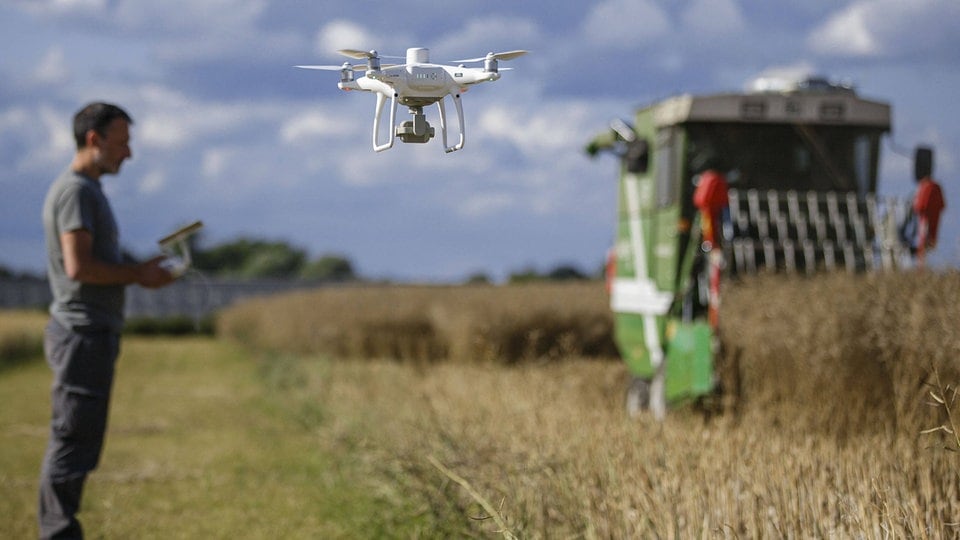Artificial intelligence has not yet played a major role in agriculture in Saxony-Anhalt. However, the Saxony-Anhalt Farmers' Association and the Ministry of Agriculture expect this to change in the next few years. New technology can help meet the demands placed on agriculture. But it also involves risks, for example in relation to data protection.
industrial Intelligence (AI) in agriculture is becoming increasingly important in Saxony-Anhalt. As the state Department of Agriculture reported upon request, the topic of artificial intelligence is becoming increasingly important, especially in collecting, processing, and evaluating large amounts of data.
AI-powered technologies are already becoming popular in agriculture. “AI-powered services are now being used in agriculture as well as in animal husbandry and fruit and vegetable growing,” a ministry spokesman said. These included, for example, milking robots, so-called productivity mapping and feeding systems in animal husbandry.
Artificial intelligence is a computer program that mimics human mental abilities. Artificial intelligence learns through what is called “machine learning”. To do this, it evaluates large amounts of data and uses it to train its learning algorithms so that it can recognize important connections on its own – so it knows, for example, when a cow needs to be milked or where a plant is in a field.
Source: Federal Ministry of Food and Agriculture
Farmers Association: The use of artificial intelligence is still under control
Marka Marka According to the Saxony-Anhalt State Farmers' Association, the use of true artificial intelligence, i.e. active learning systems, is currently still manageable. Technical solutions are used in many fields that at first glance look like artificial intelligence, but are not.
“For example, there are the first field robots in practice that walk around the field, cut weeds, and carry out these tasks seemingly autonomously. However, artificial intelligence has not yet been used,” explains the spokesman. However, research is being conducted to further develop the previously used technology with real AI.
The state says it supports farmers in using artificial intelligence, among other things Agricultural investment support program And also Agricultural advisory support.
In addition, both the federal and state governments as well as several research and teaching institutes are working to promote the use of AI in agriculture. In practice, there are already many pilot projects, real laboratories, operations and practical experiments in various fields of agriculture and animal husbandry.
Artificial intelligence in animal husbandry
Farmer Patrick Seer, one of the managing directors of Agrargesellschaft Prießnitz, confirms the farmers' association's statement that artificial intelligence does not yet play a major role in agricultural practice. So far, he has only used this technology in his own cow barn.
This is a motion sensor that cows wear around their neck. “It measures when the animal is resting, when it eats, when it goes to milking and uses that to determine different things, for example whether it is in heat or whether a disease is developing,” Zer explains.
Image credit: Photo Alliance / Bernd Vostink / German Press Agency | Bernd Westnick
Agrargesellschaft Prießnitz is a group of companies near Naumburg that manages an area of more than 4,000 hectares and employs 45 employees. In addition to arable farming, there is also a cattle stable and two pig fattening stables.
Farmer: AI makes work easier, but it doesn't change the rules of the game
but Technology needs regular feedback to improve. How well the system works also depends on how much time you invest in this feedback, Zerr says. His conclusion three years later was: “It certainly makes work easier here and there, but it can't replace people.” One cannot talk about a “big change in the rules of the game.” There simply isn't enough accuracy for that.
When asked if he could imagine using AI in other fields, Zaire said: “I don't know where it could help me. What does AI have to do for me here?” That's why there are no immediate plans to expand the use of AI in his company.
Wide range of possible uses
According to the Farmers Association, it is currently unforeseen what artificial intelligence can achieve in agriculture. But there is Many research projects in German universities. The Ministry of Agriculture sees great potential in new technologies associated with artificial intelligence.
- Detection of plant damage Based on drone or satellite images and derive recommendations for action
- More targeted and efficient Application of pesticides and fertilizers
- More individual Feed and care for farm animals
- Optimization of existing and Develop new decision-making aids (Forecasting models, apps, etc.) as well as digital assistants
- Improve product quality Through automated food quality control
- Optimal advice Through AI-powered networks for decision-making aids and advice recommendations
The Federal Ministry of Food and Agriculture has compiled more possible applications in a brochure:
The use of artificial intelligence can enhance companies
the The Farmers' Association of Saxony-Anhalt posits that artificial intelligence can help improve current technologies in the future. A variety of technical applications for sensor-controlled technology are already being used in the areas of crop protection, fertilization, soil cultivation, animal husbandry and special crop care. This sensing technology and the digital data collection it enables is a prerequisite for the use of artificial intelligence.
The Ministry of Agriculture of Saxony-Anhalt believes that AI can also help boost business in general. In order to meet future economic and environmental requirements in agriculture, new technologies must be used. With the help of artificial intelligence, resources can be saved, animal health and welfare improved, fertilizers and pesticides used more efficiently, and the farming profession made more attractive.
Artificial intelligence as a data protection risk?
the According to the state farmers' association, the use of artificial intelligence also raises questions about data protection. “Farmers’ data must be protected, both from being accessed and from being processed by third parties,” stresses one of the speakers. This requires legal solutions that provide security for agricultural companies and do not require “excessive bureaucracy.”
The Department of Agriculture also cites data protection as a potential obstacle. In general, dealing with artificial intelligence requires special care, because the scope of the risks associated with it cannot yet be fully understood, according to the ministry. Potential challenges include financing new AI-based technologies and providing the robust networks needed to use them.
More about agriculture in Saxony-Anhalt
This topic in the program:MDR SAXONY-ANHALT – Radio like us | February 16, 2024 | 4:30 pm
View all
View all

“Certified tv guru. Reader. Professional writer. Avid introvert. Extreme pop culture buff.”







More Stories
Pitch: €56m for energy startup Reverion
Plastoplan: Plastics for Energy Transition
Canon Launches Arizona 1300 Series with FLXflow Technology